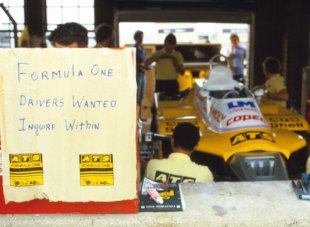As controversy brews ahead of the Bahrain Grand Prix, we look back at a race that almost didn't go ahead when the drivers stood together in defiance

- Race:
- South African Grand Prix
While the days of drivers all staying in the same resort may have been slipping away in 1982, the close camaraderie between them all was still very much in existence. Three months after Nelson Piquet had secured his first championship in Las Vegas, interest in the new season had been building ahead of the South African Grand Prix. Niki Lauda was returning to Formula One with McLaren after a two-year retirement, Alain Prost looked primed to challenge for the title with Renault against the likes of Gilles Villeneuve at Ferrari and Williams' latest addition Keke Rosberg.
An underlying row had been brewing as the paddock headed to Kyalami, however, as a number of drivers had objected to clauses added to the new superlicences that were a pre-requisite to racing in Formula One. Along with a requirement to disclose personal financial information, the clauses most in question read as follows:
'I am committed to the above team to drive exclusively for them in the FIA Formula One World Championship(s) until the [date].'
'I will do nothing which might harm the moral or material interests or image of International Motorsport or the FIA Formula One World Championship.'
Drivers were concerned that the first of these prevented their ability to enter in to contract negotiations during the season, while the latter was designed to stifle any criticism of FISA. It was Didier Pironi who had become the most vocal on many issues during the FOCA/FISA row, and after his Ferrari team-mate Villeneuve voiced his concerns that the first clause was similar to one which caused problems in the NHL, Pironi started dialogue with the governing body.
A strike was not the initial intention, but the abrasive nature of FISA president Jean-Marie Balestre was never going to help matters. As head of the Grand Prix Drivers' Association, Pironi met with the F1 Commission on the Wednesday before Saturday's race. Having informed the Commission that the drivers would not race if the superlicences weren't altered, Balestre said the changes couldn't be made and threatened bans for those who did not participate.
When the drivers arrived at the circuit the next morning they found Lauda and Pironi aboard a coach, and all joined them - bar Jochen Mass, who was late - in threatening to leave the track. Jacques Laffite was required to remove a minibus that was blocking the exit route but, united, the drivers left and locked themselves away together in protest in a conference room at the Sunnyside Park Hotel.
Pironi remained the negotiator, while Lauda took on the role of spokesman. On arrival at the hotel he admitted he wanted a swift resolution, saying: "I'm very disappointed because the only thing I'm here for is to race, so let's hope it's happening soon."
In stark contrast to the usual luxurious lifestyle the drivers were sharing mattresses on the floor, while they were kept entertained by the likes of Villeneuve and Elio de Angelis playing the piano. There they remained until Friday morning, with only Teo Fabi cracking and leaving the group.

"I would like to see all the F1 constructors sleeping together in the same bed. I was sharing a bed with Patrese. Someone next to Rosberg was snoring until Villeneuve put a blanket over him. But all the time we stayed together. We even had piano playing from Elio and Villeneuve. But we stayed together because we wanted to."
When practice started at 10am it wasn't just the governing body that was getting twitchy; the organisers of the race were threatening to sue the teams if the race didn't go ahead. The drivers were alone but held out until promises from Balestre that none would face sanctions for the strike. With verbal promises, the drivers returned an hour after the start of practice.
Derek Warwick told the BBC's Murray Walker upon his return that the drivers never planned on boycotting the race.
"To be quite honest for me it was quite extraordinary because you've got people like Villeneuve and Pironi there and we just sort of messed around and had a few discussions over the various decisions that had to be made. And the biggest point I'd like to make is we all stayed together, and to a certain extent I believe we won because there is a race tomorrow."
A race there was, and it was dominated by the turbocharged cars. Alain Prost won, climbing back through the field from eighth place following a puncture, but despite the high octane grand prix it was 24 hours of defiance from the drivers that provided the real drama of the weekend.
Chris Medland is assistant editor at ESPNF1
© ESPN Sports Media Ltd.
 Chris Medland is assistant editor at ESPNF1 Chris Medland, who in his youth even found the Pacific GPs entertaining, talked his way in to work at the British Grand Prix and was somehow retained for three years. He also worked on the BBC's F1 output prior to becoming assistant editor ahead of the 2011 season
Chris Medland is assistant editor at ESPNF1 Chris Medland, who in his youth even found the Pacific GPs entertaining, talked his way in to work at the British Grand Prix and was somehow retained for three years. He also worked on the BBC's F1 output prior to becoming assistant editor ahead of the 2011 season

